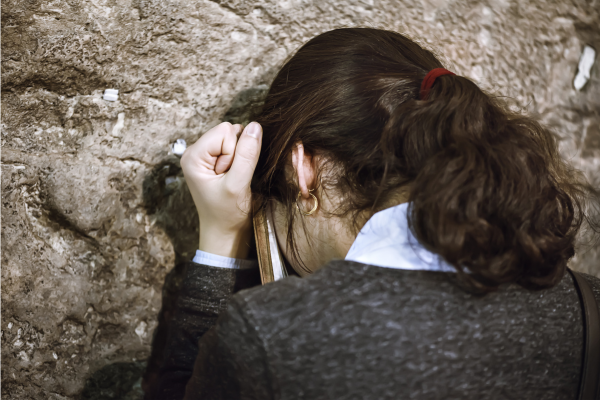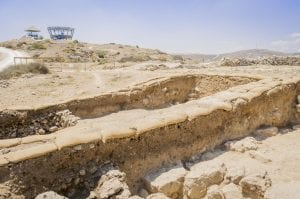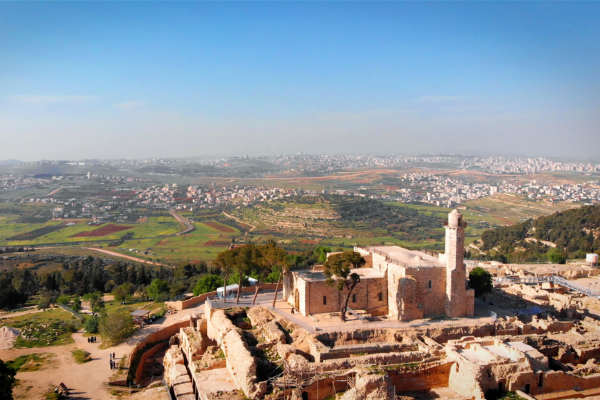
TORAH
NEVI'IM
KETUVIM
I - Chapter 1
Translation and Transliteration of
Listen to this chapter in Hebrew:
- Commentary
- Buy E-book
- Buy the Israel Bible
1There was a man from Ramathaim of the Zuphites, in the hill country of Efraim, whose name was Elkana son of Jeroham son of Elihu son of Tohu son of Zuph, an Ephraimite.
אוַיְהִי אִישׁ אֶחָד מִן־הָרָמָתַיִם צוֹפִים מֵהַר אֶפְרָיִם וּשְׁמוֹ אֶלְקָנָה בֶּן־יְרֹחָם בֶּן־אֱלִיהוּא בֶּן־תֹּחוּ בֶן־צוּף אֶפְרָתִי׃
2He had two wives, one named Chana and the other Penina; Penina had children, but Chana was childless.
בוְלוֹ שְׁתֵּי נָשִׁים שֵׁם אַחַת חַנָּה וְשֵׁם הַשֵּׁנִית פְּנִנָּה וַיְהִי לִפְנִנָּה יְלָדִים וּלְחַנָּה אֵין יְלָדִים׃
3This man used to go up from his town every year to worship and to offer sacrifice to the lord of Hosts at Shilo.—Chofni and Pinchas, the two sons of Eli, were Kohanim of Hashem there.
גוְעָלָה הָאִישׁ הַהוּא מֵעִירוֹ מִיָּמִים יָמִימָה לְהִשְׁתַּחֲוׂת וְלִזְבֹּחַ לַיהֹוָה צְבָאוֹת בְּשִׁלֹה וְשָׁם שְׁנֵי בְנֵי־עֵלִי חָפְנִי וּפִנְחָס כֹּהֲנִים לַיהֹוָה׃
4One such day, Elkana offered a sacrifice. He used to give portions to his wife Penina and to all her sons and daughters;
דוַיְהִי הַיּוֹם וַיִּזְבַּח אֶלְקָנָה וְנָתַן לִפְנִנָּה אִשְׁתּוֹ וּלְכָל־בָּנֶיהָ וּבְנוֹתֶיהָ מָנוֹת׃
5but to Chana he would give one portion only—though Chana was his favorite—for Hashem had closed her womb.
הוּלְחַנָּה יִתֵּן מָנָה אַחַת אַפָּיִם כִּי אֶת־חַנָּה אָהֵב וַיהֹוָה סָגַר רַחְמָהּ׃
6Moreover, her rival, to make her miserable, would taunt her that Hashem had closed her womb.
ווְכִעֲסַתָּה צָרָתָהּ גַּם־כַּעַס בַּעֲבוּר הַרְּעִמָהּ כִּי־סָגַר יְהֹוָה בְּעַד רַחְמָהּ׃
7This happened year after year: Every time she went up to the House of Hashem, the other would taunt her, so that she wept and would not eat.
זוְכֵן יַעֲשֶׂה שָׁנָה בְשָׁנָה מִדֵּי עֲלֹתָהּ בְּבֵית יְהֹוָה כֵּן תַּכְעִסֶנָּה וַתִּבְכֶּה וְלֹא תֹאכַל׃
8Her husband Elkana said to her, “Chana, why are you crying and why aren't you eating? Why are you so sad? Am I not more devoted to you than ten sons?”
חוַיֹּאמֶר לָהּ אֶלְקָנָה אִישָׁהּ חַנָּה לָמֶה תִבְכִּי וְלָמֶה לֹא תֹאכְלִי וְלָמֶה יֵרַע לְבָבֵךְ הֲלוֹא אָנֹכִי טוֹב לָךְ מֵעֲשָׂרָה בָּנִים׃
9After they had eaten and drunk at Shilo, Chana rose.—The Kohen Eli was sitting on the seat near the doorpost of the temple of Hashem.—
טוַתָּקָם חַנָּה אַחֲרֵי אָכְלָה בְשִׁלֹה וְאַחֲרֵי שָׁתֹה וְעֵלִי הַכֹּהֵן יֹשֵׁב עַל־הַכִּסֵּא עַל־מְזוּזַת הֵיכַל יְהֹוָה׃
10In her wretchedness, she prayed to Hashem, weeping all the while.
v'-HEE ma-RAT NA-fesh va-tit-pa-LAYL al a-do-NAI u-va-KHOH tiv-KEH
יוְהִיא מָרַת נָפֶשׁ וַתִּתְפַּלֵּל עַל־יְהֹוָה וּבָכֹה תִבְכֶּה׃
![]() 1:10 In her wretchedness, she prayed to Hashem
1:10 In her wretchedness, she prayed to Hashem

Archaeological site of biblical Shilo
Chana is heartbroken because she has no children, and goes to pray at the Mishkan in Shilo. The Mishkan stands in Shilo for three hundred sixty-nine years before the building of the Beit Hamikdash in Yerushalayim. During that time, it serves as the central focal point of the national service of Hashem. Unfortunately, many of the Israelites ignore the Mishkan, and refrain from visiting it for the pilgrimage festivals. Therefore, according to the Sages when Elkana and Chana, who were prophets, make their pilgrimages, they travel along different routes each time, in order to encourage others to join them and to serve Hashem properly. Established in 1978, contemporary Shilo is a thriving Jewish community built adjacent to the ancient site where the Mishkan stood and Chana prayed for a child. In addition to the fascinating archaeological site excavated by the Israel Antiquities Authority, modern Shilo contains several synagogues, one of which is built as a replica of the Mishkan. God continues to hear the prayers of His children in Shilo, the very same location where Chana taught her people how to pray.
11And she made this vow: “LORD of Hosts, if You will look upon the suffering of Your maidservant and will remember me and not forget Your maidservant, and if You will grant Your maidservant a male child, I will dedicate him to Hashem for all the days of his life; and no razor shall ever touch his head.”
יאוַתִּדֹּר נֶדֶר וַתֹּאמַר יְהֹוָה צְבָאוֹת אִם־רָאֹה תִרְאֶה בָּעֳנִי אֲמָתֶךָ וּזְכַרְתַּנִי וְלֹא־תִשְׁכַּח אֶת־אֲמָתֶךָ וְנָתַתָּה לַאֲמָתְךָ זֶרַע אֲנָשִׁים וּנְתַתִּיו לַיהֹוָה כָּל־יְמֵי חַיָּיו וּמוֹרָה לֹא־יַעֲלֶה עַל־רֹאשׁוֹ׃
12As she kept on praying before Hashem, Eli watched her mouth.
יבוְהָיָה כִּי הִרְבְּתָה לְהִתְפַּלֵּל לִפְנֵי יְהֹוָה וְעֵלִי שֹׁמֵר אֶת־פִּיהָ׃
13Now Chana was praying in her heart; only her lips moved, but her voice could not be heard. So Eli thought she was drunk.
יגוְחַנָּה הִיא מְדַבֶּרֶת עַל־לִבָּהּ רַק שְׂפָתֶיהָ נָּעוֹת וְקוֹלָהּ לֹא יִשָּׁמֵעַ וַיַּחְשְׁבֶהָ עֵלִי לְשִׁכֹּרָה׃
14Eli said to her, “How long will you make a drunken spectacle of yourself? Sober up!”
ידוַיֹּאמֶר אֵלֶיהָ עֵלִי עַד־מָתַי תִּשְׁתַּכָּרִין הָסִירִי אֶת־יֵינֵךְ מֵעָלָיִךְ׃
15And Chana replied, “Oh no, my lord! I am a very unhappy woman. I have drunk no wine or other strong drink, but I have been pouring out my heart to Hashem.
טווַתַּעַן חַנָּה וַתֹּאמֶר לֹא אֲדֹנִי אִשָּׁה קְשַׁת־רוּחַ אָנֹכִי וְיַיִן וְשֵׁכָר לֹא שָׁתִיתִי וָאֶשְׁפֹּךְ אֶת־נַפְשִׁי לִפְנֵי יְהֹוָה׃
16Do not take your maidservant for a worthless woman; I have only been speaking all this time out of my great anguish and distress.”
טזאַל־תִּתֵּן אֶת־אֲמָתְךָ לִפְנֵי בַּת־בְּלִיָּעַל כִּי־מֵרֹב שִׂיחִי וְכַעְסִי דִּבַּרְתִּי עַד־הֵנָּה׃
17“Then go in peace,” said Eli, “and may the God of Yisrael grant you what you have asked of Him.”
יזוַיַּעַן עֵלִי וַיֹּאמֶר לְכִי לְשָׁלוֹם וֵאלֹהֵי יִשְׂרָאֵל יִתֵּן אֶת־שֵׁלָתֵךְ אֲשֶׁר שָׁאַלְתְּ מֵעִמּוֹ׃
18She answered, “You are most kind to your handmaid.” So the woman left, and she ate, and was no longer downcast.
יחוַתֹּאמֶר תִּמְצָא שִׁפְחָתְךָ חֵן בְּעֵינֶיךָ וַתֵּלֶךְ הָאִשָּׁה לְדַרְכָּהּ וַתֹּאכַל וּפָנֶיהָ לֹא־הָיוּ־לָהּ עוֹד׃
19Early next morning they bowed low before Hashem, and they went back home to Rama. Elkana knew his wife Chana and Hashem remembered her.
יטוַיַּשְׁכִּמוּ בַבֹּקֶר וַיִּשְׁתַּחֲווּ לִפְנֵי יְהֹוָה וַיָּשֻׁבוּ וַיָּבֹאוּ אֶל־בֵּיתָם הָרָמָתָה וַיֵּדַע אֶלְקָנָה אֶת־חַנָּה אִשְׁתּוֹ וַיִּזְכְּרֶהָ יְהֹוָה׃
20Channah conceived, and at the turn of the year bore a son. She named him Shmuel, meaning, “I asked Hashem for him.”
כוַיְהִי לִתְקֻפוֹת הַיָּמִים וַתַּהַר חַנָּה וַתֵּלֶד בֵּן וַתִּקְרָא אֶת־שְׁמוֹ שְׁמוּאֵל כִּי מֵיְהֹוָה שְׁאִלְתִּיו׃
21And when the man Elkana and all his household were going up to offer to Hashem the annual sacrifice and his votive sacrifice,
כאוַיַּעַל הָאִישׁ אֶלְקָנָה וְכָל־בֵּיתוֹ לִזְבֹּחַ לַיהֹוָה אֶת־זֶבַח הַיָּמִים וְאֶת־נִדְרוֹ׃
22Channah did not go up. She said to her husband, “When the child is weaned, I will bring him. For when he has appeared before Hashem, he must remain there for good.”
כבוְחַנָּה לֹא עָלָתָה כִּי־אָמְרָה לְאִישָׁהּ עַד יִגָּמֵל הַנַּעַר וַהֲבִאֹתִיו וְנִרְאָה אֶת־פְּנֵי יְהֹוָה וְיָשַׁב שָׁם עַד־עוֹלָם׃
23Her husband Elkana said to her, “Do as you think best. Stay home until you have weaned him. May Hashem fulfill His word.” So the woman stayed home and nursed her son until she weaned him.
כגוַיֹּאמֶר לָהּ אֶלְקָנָה אִישָׁהּ עֲשִׂי הַטּוֹב בְּעֵינַיִךְ שְׁבִי עַד־גָּמְלֵךְ אֹתוֹ אַךְ יָקֵם יְהֹוָה אֶת־דְּבָרוֹ וַתֵּשֶׁב הָאִשָּׁה וַתֵּינֶק אֶת־בְּנָהּ עַד־גָּמְלָהּ אֹתוֹ׃
24When she had weaned him, she took him up with her, along with three bulls, one efah of flour, and a jar of wine. And though the boy was still very young, she brought him to the House of Hashem at Shilo.
כדוַתַּעֲלֵהוּ עִמָּהּ כַּאֲשֶׁר גְּמָלַתּוּ בְּפָרִים שְׁלֹשָׁה וְאֵיפָה אַחַת קֶמַח וְנֵבֶל יַיִן וַתְּבִאֵהוּ בֵית־יְהֹוָה שִׁלוֹ וְהַנַּעַר נָעַר׃
25After slaughtering the bull, they brought the boy to Eli.
כהוַיִּשְׁחֲטוּ אֶת־הַפָּר וַיָּבִיאוּ אֶת־הַנַּעַר אֶל־עֵלִי׃
26She said, “Please, my lord! As you live, my lord, I am the woman who stood here beside you and prayed to Hashem.
כווַתֹּאמֶר בִּי אֲדֹנִי חֵי נַפְשְׁךָ אֲדֹנִי אֲנִי הָאִשָּׁה הַנִּצֶּבֶת עִמְּכָה בָּזֶה לְהִתְפַּלֵּל אֶל־יְהֹוָה׃
27It was this boy I prayed for; and Hashem has granted me what I asked of Him.
כזאֶל־הַנַּעַר הַזֶּה הִתְפַּלָּלְתִּי וַיִּתֵּן יְהֹוָה לִי אֶת־שְׁאֵלָתִי אֲשֶׁר שָׁאַלְתִּי מֵעִמּוֹ׃
28I, in turn, hereby lend him to Hashem. For as long as he lives he is lent to Hashem.” And they bowed low there before Hashem.
כחוְגַם אָנֹכִי הִשְׁאִלְתִּהוּ לַיהֹוָה כָּל־הַיָּמִים אֲשֶׁר הָיָה הוּא שָׁאוּל לַיהֹוָה וַיִּשְׁתַּחוּ שָׁם לַיהֹוָה׃







